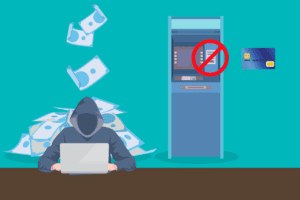
Being a victim of an online scam can happen to anyone. The internet is vast with no boundaries. For online swindlers, it makes the multi-billion-dollar industry, cyber-scamming easier than ever. Protect yourself and your loved ones by recognizing five popular scams that could catch you in their web.
Today technology, and even more predominantly the internet, is almost an extension of self. According to the 2022 Data Reportal insights, regular internet users spend more than 40 percent of their lives online.
What once was reserved for professionals is now our personal information superhighway available in our pockets and on our desktops. The world wide web is a truly remarkable piece of technology, but cyberspace regularly exposes you to danger. Internet villains lay silently among browsers, patiently waiting to strike on unsuspecting victims, possibly even you.
1. The “Catfish Con Artist”
Nearly everyone is connected digitally through social media. Perhaps you have a Facebook and limit it to close friends and family members. You may be wondering, “how am I susceptible to a scam when I only allow access to my account to loved ones?” Unfortunately, it is relatively easy to pose as a different person on the internet without getting caught. Commonly, a catfish will steal photos from a third party, in this case, a family member, and then pose as them to scam you online. Typically, scammers portray that they are in trouble and need money from you. Ensure you check profiles before falling into the insidious trap of a scam artist.
2. The “Shopping Scammer”
In our day of age, shopping online is immensely popular, and it is easier and faster than ever to get your items at the touch of your finger. A 2022 Raydiant study on the behaviors of consumers showed that 56.6% of survey respondents prefer online shopping. With many rises in technology, there always seems to be an idea for a new scamming campaign. If a deal online seems to be ‘Too Good To Be True,’ most likely it is fake. If someone is trying to sell you a 10,000-dollar Ferrari, the odds are unlikely you receive the key. Scammers pretend to be legitimate sellers online and even pose ads to pull you into their site and get your money without ever sending you a product. Make sure you always check the legitimacy of a site before purchasing and do not impulsively buy something you are not certain you will ever receive.
3. The Tech “Fraudster”
The scammers may approach you or a family member to assist with a problem that does not even exist. Their goal is to access your confidential information or your computer by posing as customer support. Sometimes these scammers pretend to run diagnostic tests on your computer, they do not want to help, but they want to steal your information. In some instances, these scammers will pay for advertisements to pop up for popular companies in hopes you believe it is a legitimate site. Always ensure you are on the correct website and never give out information over the phone unless it is a certified number for the company.
4. The “Dating Site Swindler”
The emergence of dating sites allowed millions of people to find success in their love lives on the internet. The rise of users on dating platforms paved the way for personal gain for scammers, and it is not love they look for but money. These cybercriminals play the long game when it comes to scamming. They gain your trust first on dating platforms, convincing you that they care about you, and the harsh reality is that it is only to access your personal information.
5. The Email “Spammer”
Like me, you may have a spam folder filled with hundreds of junk emails, maybe even thousands. Email platforms work hard to protect their users, but sometimes online scams slip through the cracks in the system. Some scammers target individuals through email in hopes of stealing your information. Commonly, scammers will pose as your bank and request you confirm your security details, and once they have the necessary numbers, they work rapidly to steal from you. Scammers will dry up your funds with no remorse and access any other accounts with the stolen information. Don’t be susceptible to email scammers. Avoid opening any links in emails that you are unaware of the source, and always avoid giving out valuable personal information.
Stay Aware
The internet is immensely useful and a true asset to all of us, but there are definite threats it poses to your wellbeing. Scammers are constantly flooding the internet, waiting to make their next move to steal from innocent people. Staying aware and taking the precautions available to avoid scammers is important in a world that is so digitally connected. Share this blog with a friend or family member to help us all be better protected.
If you are a business owner and want to find out how to protect your company from a data breach, click here to get in contact with one of our agents about cyber liability insurance.



